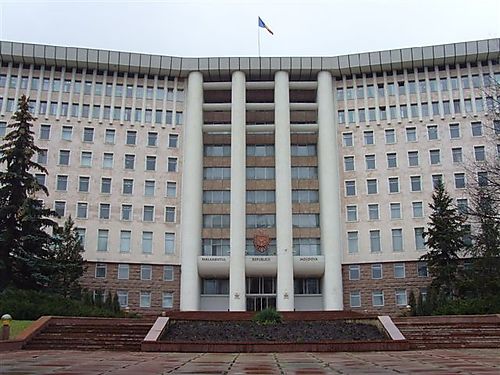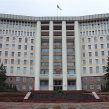
Moldova Descending into Vacuum of Authority after Failed Presidential Election
Publication: Eurasia Daily Monitor Volume: 6 Issue: 100
By:

On May 21 the newly elected Moldovan parliament fell one vote short of the three-fifths majority necessary for electing the head of state. All the 60 deputies from the nominally communist party voted for the party’s presidential candidate, incumbent Prime Minister Zenaida Greceanai, who is (like almost all the cabinet members) a politically unaffiliated expert. Greceanai needed 61 votes to be elected in the 101-seat parliament. She fell short because the 41 opposition deputies from three nominally liberal parties boycotted the vote (Moldpres, Basapres, May 21).
A second, final vote is scheduled for May 28, but the opposition has already announced that it plans to boycott it in order to force new parliamentary elections, in effect cancelling those held on April 5. Under Moldova’s constitution, a failed presidential election triggers automatically the dissolution of parliament and new elections.
The three opposition parties’ leaders dictated the boycott decision to their deputies. The balloting being secret, the leaders justifiably feared that a few of their deputies could vote for the presidential candidate, thereby avoiding new parliamentary elections.
New elections are now a certainty, barring a last-minute "purchase" of one or two votes in parliament by the majority party. According to outgoing President Vladimir Voronin’s top adviser, Marc Tcaciuc, it would have been easy to "purchase" a few votes among opposition deputies already for the May 21 round of voting; but "it would have looked and smelled bad," Tcaciuc felt (Interfax, May 21).
The majority party, three-time winner of Moldova’s parliamentary elections under the "communist" brand, seems stoically resigned to new elections, although it may well lose this time. The entire electoral process – registration of parties, compilation of voter registration lists, formation of candidates’ slates, the pre-election campaign – must start again. It may not be until August or, more likely, September that the new parliament will be able to constitute itself, elect a new head of state and approve a new government.
Pending the completion of this process, Moldova will descend into a vacuum of authority. No institution will be authorized to adopt laws or other acts with legal value; and the caretaker government will only be authorized to issue minor day-to-day decisions, not policy initiatives or senior-level appointments.
During these months of institutional limbo, the economic crisis -which is already hitting Moldova- will gather full force. Whether the Moldovan state will have the necessary legal authority to negotiate with international financial institutions and the EU seems far from certain during the crisis months ahead. The start of negotiations with the EU toward an association agreement, which seemed a likely prospect before the April 5 elections, is also receding now.
The joint efforts by Moldova, the EU, and the United States to restart international negotiations on Transnistria -as intended by the EU in particular for the post-April 5 election period- will be re-consigned to the deep freeze. The Moldovan presidency and some elements in the government carry their share of responsibility for the country’s post-election predicament. They failed to initiate negotiations with the opposition, even as the opposition itself seemed unwilling or unable to negotiate.
To justify their push for new elections, the opposition parties insist that the April 5 elections were falsified. Thus they deem the newly elected parliament illegitimate, as the opposition leaders insisted down to the wire on May 21 (Infotag, Pro-TV, May 21).
That attitude flies in the face of Western observers’ generally positive assessment of the April 5 elections (with recommendations for further improvements to the process). It also ignores EU officials’ efforts to persuade the opposition to recognize the April 5 election outcome and work in the new parliament. A modus-vivendi document to that effect was worked out by EU officials and presented by Javier Solana, EU High Representative for Foreign and Security Policy, personally on April 24 in Chisinau. It remained without consequences, mainly because opposition leaders ruled out recognizing the election result.
With these tactics, the Moldovan as well as the Georgian opposition parties caricaturize the "color revolutions" of yesteryear. In the Georgian, Ukrainian, and other regime-changing revolutions, elections were invalidated after opposition parties proved falsifications and Western observers assessed those elections as fundamentally flawed. Such were the preconditions to invalidating the Georgian, Ukrainian, and other elections and calling new ones during that period.
This causality has been turned on its head in the 2008 Georgian and 2009 Moldovan elections. In these situations, opposition parties have summarily dismissed the positive assessments issued by the joint observation missions of the OSCE, its ODIHR, Parliamentary Assembly of the Council of Europe, and European Parliament observers in each case. Such tactics impugn the integrity of this observation mechanism and undermine its viability, even as the Kremlin for its own purposes rejects the European observers’ election assessments in other places. Moldovan as well as Georgian opposition parties are using these tactics because they regard parliamentary and presidential elections as opportunities for regime-change, irrespective of the popular vote’s arithmetic.




